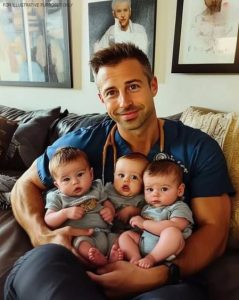Title: Blood and Bond

When Maria died, the world shifted for everyone she left behind. Her two children, Elena and Mateo, were just six and four, too young to understand the permanence of death. Her physician, Dr. Rafael Mendez, was the one who had been by her side through the illness, who held her hand in the final hours, and who promised her—when she could no longer speak—that he would take care of her children.
It wasn’t a promise he took lightly.
Rafael was not their father by blood, but he had been a constant in their lives since Maria’s diagnosis. When no family stepped forward—least of all the man who had abandoned Maria before Mateo was born—Rafael became everything to them: guardian, father, mentor, and eventually, simply “Dad.”
The years passed, steady and kind. Rafael raised them in a warm home filled with books, Sunday pancakes, and medical charts scattered across the kitchen table. He taught Elena how to ride a bike, sat through Mateo’s science fairs, and comforted them through heartbreaks and school troubles. He never pretended to replace Maria, but he made sure her presence was always felt.
By the time Elena turned seventeen, and Mateo fifteen, they were inseparable. Rafael was, to them, the only father they ever knew.
Until the letter arrived.
It was addressed to Elena. A handwritten note from a man named Luis Ortiz—her biological father. He had been following her from afar, he wrote, watching her grow through scraps of social media and whispers from mutual contacts. Now, he wanted to meet her. He claimed he had changed. He had a home, stability, a new family. And he wanted to be part of hers again.
Rafael found her in the backyard, letter in hand, tears brimming.
“Did you know he was alive?” she asked.
Rafael nodded slowly. “I knew. But he never asked about you. Not until now.”
“What if I want to meet him?”
“You can. I won’t stop you. But I need you to be careful. People don’t always return for the right reasons.”
Luis’s reentry was abrupt and disruptive. He wanted dinners, weekends, introductions to his new wife and stepchildren. He started showing up at school events and suggesting career plans, questioning Rafael’s decisions, even casually suggesting that the kids consider moving in with him for part of the year.
Rafael stayed silent, though his heart ached. He had raised them, loved them through scraped knees and sleepless nights. Now this man, who once abandoned them, was trying to rewrite the narrative.
It all came to a head one evening when Luis showed up uninvited to Elena’s art show. Rafael had arrived early, helping her set up, smoothing her nerves. When Luis entered, he tried to take the spotlight—boasting about her talent, offering to fund an art program abroad.
That night, Elena spoke plainly.
“I appreciate your support,” she told Luis, “but you don’t get to walk back into my life and pretend you were always here. You left. He didn’t.”
She looked to Rafael, whose eyes were glossy but proud.
“You’re my biological father, Luis. But you’re not my dad. Rafael raised me. And nothing will ever change that.”
Luis left quietly. In the silence that followed, Rafael placed a hand on her shoulder.
“You didn’t have to choose,” he said softly.
She smiled. “I didn’t. You were always the answer.”
And so life returned to its rhythm. The bond forged not by blood, but by love, endured—quiet, unwavering, and true.